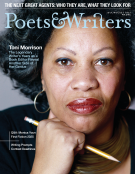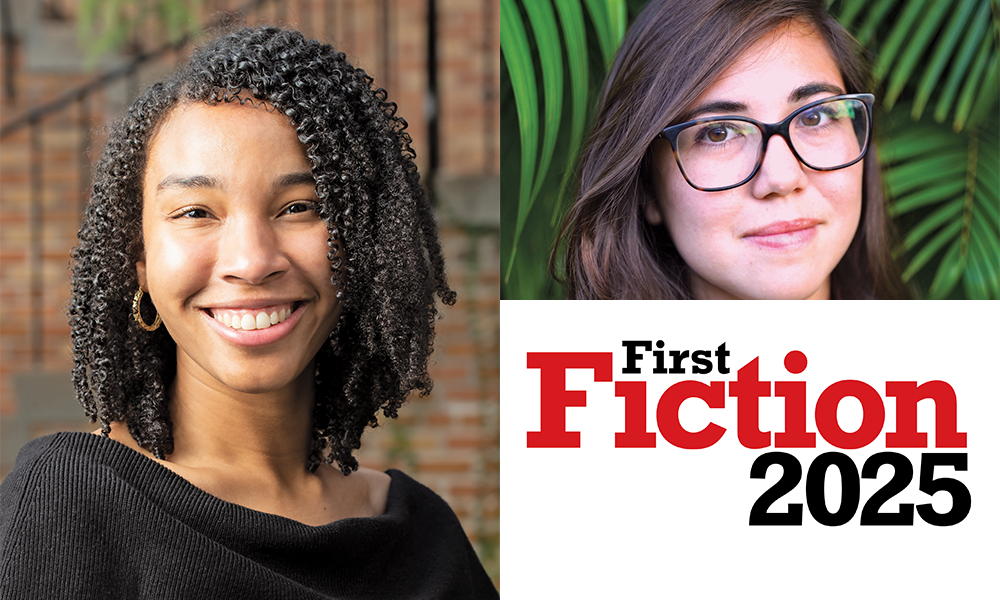Carrie R. Moore, whose debut story collection, Make Your Way Home, will be published in July by Tin House Books, introduced by Megan Kamalei Kakimoto, author of the story collection Every Drop Is a Man’s Nightmare, published by Bloomsbury in 2023. (Credit: Moore: Matt Valentine; Kakimoto: Van Wishingrad)
![]()
I have always been taken with writers who can render a complicated place with the utmost care, and Carrie R. Moore is exactly that writer—though her spectacular debut collection, Make Your Way Home, encompasses much more than just keen attention to place. The Black men, women, and families orbiting these stories are reckoning with generational inheritance and trauma, romantic and erotic love, ideas of faith and freedom. Yet it’s the American South that serves as the book’s point of departure to question, unpack, and probe these thematic concerns while arriving at a place of necessary complexity so reflective of its starting point. Across these eleven stories, the through-line is one of devotion to humanity; through a deeply compassionate lens, Moore illuminates the tenderness underlying the human condition and makes the reading of Make Your Way Home a transformative experience.
The portrait of the South as depicted in these eleven stories is one of unyielding complication—and ultimately of a deep, yet pained, love. Did you set out to write into place so intentionally, and how did you navigate attending to the intersection of place and history?
That was precisely my intention. I’m from Georgia, and the South is my home. It’s full of memories of savoring my grandmothers’ home cooking and laughing at my cousins’ jokes, of taking road trips with my parents and twisting my sister’s hair. Which is to say, the South’s history for me is complicated, not solely defined by its horrors. I felt that a story collection was the ideal form for capturing the region’s complexity. Every piece could explore something different, preventing the South from being defined by a single experience. Still, what links each story is how history pushes in. The past always interrupts the characters’ lives, even if only for a moment. These small interruptions were how I tried to balance history and place.
I’m struck by the emotional depth of your characters, how you render such emotionally rich lives in short form. Can you speak to your approach in creating characters?
All of my characters are born from some emotional question I’m grappling with in my own life: How do I keep loving people who’ve disappointed me? In what ways can I metabolize rage when Black women are so judged for it? My characters adopt extreme responses to such questions, and many of their struggles come from suppression; every story features a moment in their lives when they can no longer stifle their true feelings. That sort of structure allows for emotion to rise to the surface. A story doesn’t feel done, however, until there’s some sliver of hope at the end. Despite these challenging moments in my characters’ lives, they must emerge from these trying experiences more healed, more self-aware.
Your stories move with grace, transitioning elegantly from one tale to the next as if the stories themselves demanded their entrances. What were you considering when ordering the collection?
My editor, Elizabeth DeMeo, and I did so much reflecting on this. Initially the collection moved solely from past to future, revealing a portrait of the American South over a period of two hundred years. The reader would begin in 1920s Florida and end in the 2120s in Tennessee. But the first story in a collection indicates so much about where a book is going, and I was concerned that opening in the 1920s might make some readers think the book wasn’t going to have many contemporary narratives. I wanted to be clear from the beginning that my stories are deeply interested in history, yet they also seek to reflect multifaceted Black communities that insist on being here now. There’s one story that features children dancing to Michael Jackson in the nineties and a later one about a grandmother recalling an encounter with the Klan. There’s a story that features both slavery and Reddit and another that acknowledges root-working practices and Beyoncé. Elizabeth and I decided to open Make Your Way Home with “When We Go, We Go Downstream”—which itself spans over one hundred fifty years—to indicate the collection’s scope. From there every story progresses more or less chronologically. My hope is that the reader experiences multiple threads of time, the way the South constantly tugs on past, present, and future.
Several stories were previously published in renowned journals such as the Sewanee Review and Virginia Quarterly Review. How have the pieces changed since their initial publications, and has your relationship to them changed?
I wrote the first story for this collection when I was twenty, and it would take over a decade to finish the others. In a way, I grew up alongside this book. My standards got higher. I learned to be simultaneously careful with my characters’ portrayals and honest about history. Outside of my own changing intentions, new methods and resources became available for research, allowing me access to more knowledge. Then the global pandemic hit, and traveling was suddenly off-limits. For many of the stories’ magazine versions, I was limited by memories of past trips or by what I could learn from a distance. But after this collection sold, my husband and I took a road trip across the South to revisit some of the book’s settings or visit others for the first time. Now my hope is that my stories feel fuller, enriched by the sort of geographic and historical details that come from field work. The writer I am now had to be able to stand behind the decisions of her twenty-something counterpart.
An excerpt from Make Your Way Home
“Naturale”
For a long time after, I softened. Even more than I had during my life up until then: daughter, niece, hairdresser, wife. All that time practicing being warm and willing to carry just about anything.
I carried Oriah too that April. Took in his apologies for not being the husband he should’ve been, for falling in love with someone else that winter. He let it spill out right around his spring break, his body leaning against the kitchen countertop, his fingertips pressing from brown to white against the granite: “It was just the one time. At the dig. I knew it was a mistake as soon as it was over and all that wind started flapping through the tent.” It was the first time I’d ever seen him cry, and when he said, “Please, tell me what I can do,” I swallowed and said only, “Alright. Can I have a minute to myself?”
I canceled my clients so we could spend a week inside our pollen-dusted town house, trying to piece our marriage back together. We sat cross-legged on our cream carpet, taking turns playing his archaeology podcasts and my neo soul records, songs about letting your hair down. We ate tart plums on our back patio, as if eating with our hands could return us to those early nights when I slept in his crummy grad-student housing, his tenure-track job nowhere in sight. In the few moments I left his side to relieve myself or to breathe, I wandered barefoot through our hallway’s cedar light, stepping in the footprints he’d left in the rug, like I was warming myself up to touching him again. In truth, the pollen smearing the sash windows was a relief. No woman who might’ve been watching from the sidewalk could peer in and measure herself against me.
With the way Oriah was determined to give me space, it took us until the end of that week to get naked with each other again. Bathing together was my idea. A way for us to take back everything that came with being married, because it already felt like that woman was keeping his body away from me. We soaked on opposite sides of our claw-foot tub, and through the bathroom window, Charleston light fell violet and nervous over the bathwater. I’d started wearing my hair down from its usual high puff, and it worked itself into tight knots as it floated between us.
“But do you really get what I mean?” he said. He wasn’t touching me, his large hands wrapped around his dark legs. “About being two people at once? That’s how it was. Like I wasn’t even me. Like I wasn’t—”
“I know,” I said, and I made myself reach for his hand. “Really, please don’t explain it again.”
Who cared if he was shy to wrap his fingers around mine? Anything was better than him talking about it. I’d asked him not to tell me her name, since even just knowing they’d worked together had given me visions. A woman with hair flowing in loose waves over her back, over his arms as he held her against him. When she emerged from the tent and went back to crouching over rusted pottery shards, its neat ends would sweep the earth. No kinks like mine.
“Tell me something else,” I said. “Like what you want to do tomorrow. Or I can tell you about this new idea I have for the salon. Or you can tell me about how your work’s going otherwise.”
“That’s what you want to talk about?” He pulled his hand back. Let it slip underwater. “It’s my fault, and you’re acting like it’s that easy. Gone. Over and done with.”
“Not easy,” I said, scooping water over my knees. “Just alright.”
Carefully, his shy fingers pinching the ends of my hair, he let himself talk about the colonoware his team was unearthing, the site an hour north of Charleston. I’d been there a few times before. That plantation ground littered with ceramic fragments, traces of vessels enslaved women had spent hours coiling from clay, wall after thick wall to hold water, rice, whatever needed containing. I watched the brown in his eyes lighten as he talked, and I tried to make mine light too, attentive—as if he were taking me with him into that life. That wet sun and those flashes of tan in the soil and his hands brushing away the past. He couldn’t get enough of it. Not with how he already spent so much time at the university behind a classroom podium or in meetings with full professors who hadn’t visited a dig in years, the sort of academic he was afraid of becoming.
“Doesn’t have to be you when you get tenure,” I said. “You love it too much.”
He looked at me. Then he all at once leaned forward and slipped his hands around the backs of my knees. “I don’t work with her anymore, you know,” he said. As he sweated in the warm water, he seemed to be emerging from something, his body shiny everywhere except the center of his brown face. “I told her—we’d reached the end of things. It was going to be you from now on.”
“I know,” I said. “I believe you.”
Excerpted from Make Your Way Home by Carrie R. Moore. Reprinted with permission from Tin House. Copyright © 2025 by Carrie R. Moore.









